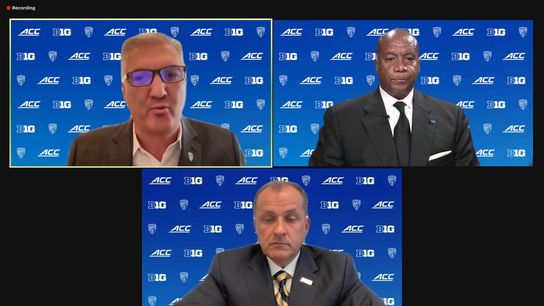The Atlantic Coast, Big Ten and PAC-12 conferences on Tuesday held a joint press conference with each league's respective commissioner to formally announce a cooperative “alliance” between the three conferences that is specifically going to include exclusive football scheduling parameters, as well as a similar setup for men's and women's basketball.
“I'm bullish on the future of this alliance,” said ACC Commissioner Jim Phillips, while Big Ten head Kevin Warren said the arrangement would “provide an opportunity to play in some epic contests.”
“Today is a historic moment but it is the very beginning of a long alliance,” PAC-12 leader George Kliavkoff said.
The trio provided few specifics on the alliance but revealed that the agreement has no signed contracts to bind it together.
“It's based on trust,” Phillips said.
Kliavkoff broke it down in-depth.
“There's no signed contract,” he signed. “It's an agreement among three gentlemen, a commitment from 41 presidents and ADs (from the three conferences) to do what we say we're going to do. We want to make sure we can deliver 100% of what we promise.
“We're aligned but there's no contract, no signed document and there doesn't need to be.”
As it pertained to current signed contracts – specifically those for football matchups – the group emphasized those contracts would remain unchanged.
They touted the Sept. 11 Big Ten-PAC-12 matchups next month – Oregon at Ohio State; Washington at Michigan – and cited that 68 future intersectional matchups through the mid-2030s already have been scheduled among the trio of leagues' members.
“That number doesn't include Notre Dame,” said Warren. “I think if you include Notre Dame, it is 103 (football) games.”
The trio also did show a willingness from both the Big Ten and PAC-12 to wholly endorse an expanded College Football Playoffs – while they admitted some issues remained to be worked through – while Phillips said the ACC had not yet settled on a “final decision about where we will fall.”
“I'm a big believer in expanding the College Football Playoffs, but I'm also a big believer in being methodical n doing our homework,” Warren said. “One thing we promised in our last CFP meeting was that we would do our homework. I've talked to over 100 individuals in our Big Ten football footprint, all coaches and ADs included and a number of student-athletes …
“I think we need to be very methodical as we make decisions because this will impact our student-athletes because we need to think through the length of the season, not only the physical (demands) but mental (toll) as well.”
“The PAC-12 is 100% in favor of the expansion of the College Football Playoffs, with some issues at the margins to be resolved,” Kliavkoff said. “The work done by the (CFP playoffs expansion) committee is exemplary.
“We're going through a process and for me that means condensing my visits to every single school so that they're terminated by Sept 28 [the next step in the CFP expansion exploratory stage]. We're all doing this work so that Sept. 28 we have good feedback to provide to the committee.”
Warren declined to divulge if the Big Ten would reduce its number of conference games in the future in order to accommodate scheduling components of this alliance; the Big Ten head merely said it was a factor being reviewed.
Kliavkoff said that the PAC-12 was contractually obligated with ESPN and FOX, its key broadcast partners, to play nine conference games but noted “to move to fewer games, we would need to have partnership with ESPN and FOX to do that but the games we could potentially replace (conferences matchups) with could be very compelling.”
The group also said the move was not driven specifically by revenue concerns but rather to "stabilize" the college athletics landscape now and moving forward on the heels of the Southeastern Conference's impending acquisitions of the University of Oklahoma and University of Texas.
